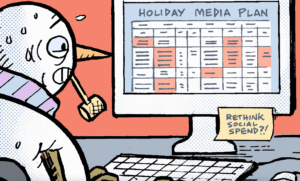Here’s today’s AdExchanger.com news round-up… Want it by email? Sign up here.
Scoring The Super Bowl
Viewers watching Super Bowl commercials on Sunday were three times more likely to look up those advertisers online compared to everyday primetime TV, according to search data released Monday morning by EDO.
Guess that’s something, considering it costs around $7 million for a 30-second spot.
The secret to success is having access to a very tuned-in audience.
Attention usually declines throughout TV ad breaks – except during the Super Bowl, which is the only TV event that experiences the opposite effect, says Jura Liaukonyte, associate professor at Cornell University’s SC Johnson College of Business, citing data from a recent study she co-authored.
People “pay more attention [to the ads] than the game,” Liaukonyte told AdExchanger.
Which is good news for brands that can afford top-end placements.
Around 40% of the brands that ran commercials during the big game were first-timers – most notably cryptocurrency companies. Crypto.com, FTX, Coinbase and a few sports betting apps all made their Super Bowl debuts on Sunday.
Coinbase’s spot featured a bouncing QR code that was supposedly so popular it caused the app to crash, The Verge reports. It’s always good to try new things, although, by the same token, millions of potential customers were likely greeted by a site error page.
Missing The Podium
Ratings for the Beijing Winter Olympics are, unsurprisingly, terrible.
To be fair, NBC forecasted low numbers. Taking place six months after the summer games (always more popular) and in empty, fan-less winter sports compounds, what can you expect, said NBC Sports Chairman Pete Bevacqua on a conference call, as reported by The Hollywood Reporter.
“Advertisers know that they don’t buy ratings, they buy the value of the games,” NBCU ad sales leader Kelly Abcarian tells THR. “Historically, ratings were designed for a world where the ads traveled with the content, and now they don’t have to be.”
NBCU’s silver lining is solid results for Peacock.
But the big miss on ratings and general consumer interest is somewhat self-imposed and related to the Olympic organization’s obsession with controlling media related to the event, regardless of whether it may value the games.
Comedian Leslie Jones, for example, did her popular livestreamed Instagram videos – until they were removed. NBC admitted that was a mistake – Jones actually had a formal deal for live commentary during the last two Olympics. But Olympic footage automatically triggers takedown notices. Even athletes find their accounts suspended if they post from the event, and major sports news destinations like ESPN or Bleacher Report apps barely carry Olympic content.
We ask, would it be so bad if the Olympics were to spawn popular memes, content and updates via athlete accounts from the games, even if it wasn’t directly monetized?
Speak Microsoftly And Carry A Big Stick
Microsoft isn’t a major app store player – but it could be a gamechanger.
Last week, Microsoft published its “Open App Store Principles.” The notable changes Microsoft proposes for the mobile economy include not unfairly privileging owned services on an app store and allowing fair payment processing by outside companies.
On its own, the announcement is insignificant because, let’s face it, so is the Windows app store. But it “stands in stark contrast to the operating model of the App Store on iOS, and, to a lesser extent, Google Play on Android,” writes Eric Seufert of Mobile Dev Memo.
Mobile developers need some third force to break Apple and Google’s deft, synchronized management of in-app revenue. Apple and Google always seem to play hardball or make the same developer concessions at around the same time, Seufert writes, whether that be developer fee reductions, second-year subscription reductions, small business programs or digging in by country to fight requirements for alternative payment processing.
Developers need a wave of laws, regulation and outside pressure to get Google and Apple to change their app store policies.
But Microsoft at least makes one very salient point directed at Google and Apple: “If Microsoft can offer alternative payments, why can’t you?”
But Wait, There’s More!
Instagram’s video ad revenue sharing program has underwhelmed participating publishers. [Digiday]
Facebook has a super-user supremacy problem. [The Atlantic]
Mike Shields Substack: Netflix is never going to run ads. Isn’t that what we said about HBO? [blog]
The Super Bowl was full of celebrities. Why were there no creators? [The Information]
Embedded Substack: Why is TikTok so scared of 30? [blog]
Stressed about the economy? These ads are for you. [NYT]
You’re Hired!
Outbrain hires Paul Knegten as its first CMO. [release]
Jordan Lieberman joins Fourthwall as SVP and product chief for its political data platform. [LinkedIn]
The Trade Desk appoints its COO, Michelle Hulst, as chief data officer. [LinkedIn]











